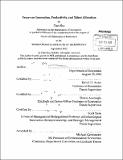| dc.contributor.advisor | David H. Autor, Daron Acemoglu and Scott Stern. | en_US |
| dc.contributor.author | Shu, Pian | en_US |
| dc.contributor.other | Massachusetts Institute of Technology. Dept. of Economics. | en_US |
| dc.date.accessioned | 2013-03-13T15:48:03Z | |
| dc.date.available | 2013-03-13T15:48:03Z | |
| dc.date.copyright | 2012 | en_US |
| dc.date.issued | 2012 | en_US |
| dc.identifier.uri | http://hdl.handle.net/1721.1/77796 | |
| dc.description | Thesis (Ph. D.)--Massachusetts Institute of Technology, Dept. of Economics, 2012. | en_US |
| dc.description | Cataloged from PDF version of thesis. | en_US |
| dc.description | Includes bibliographical references. | en_US |
| dc.description.abstract | This thesis contains three essays on innovation, productivity, and talent allocation. The first essay explores a novel channel through which short-term economic fluctuations affect the long-term innovative output of the economy: innovators' accumulation of human capital. Using a newly constructed data set on the patenting history of all individuals obtaining a bachelor's degree from the Massachusetts Institute of Technology (MIT) between 1980 and 2005, I find that cohorts graduating during booms produce significantly fewer patents over the subsequent two decades. Initial economic conditions do not affect inventors' long-term occupational affiliation, suggesting that the main differences lie in their long-term level of inventive human capital. The decrease in patent output of cohorts graduating during booms is mainly from inventors with relatively low GPAs, and marginal patents receive fewer citations than the rest. The second essay uses the 2008 financial crisis as a natural experiment to study the characteristics of recent graduates from MIT bachelor programs who pursued a career in finance immediately after graduation. I find that finance competes against science and engineering graduate programs for the best talent from MIT but values academic skills less. As a result of endogenous skill development during college, financiers have significantly lower academic skills than students entering graduate school at graduation, despite having similar levels of raw academic talent measured at college entrance. Marginal financiers have lower starting salaries than average financiers, suggesting that there is positive selection into finance. The third essay examines the asset accumulation and labor force participation of Social Security Disability Insurance applicants. Using the RAND Health and Retirement Study panel data, I provide empirical support for the theory that an imperfectly screened disability insurance program encourages individuals who dislike work to save more in the present and plan to apply for disability insurance in the future, regardless of their future health. Despite exhibiting lower labor force attachment and earning less than accepted applicants, rejected applicants have significantly more assets immediately prior to their application, but not in the several years before. Although imperfect, the current screening differentiates the applicants in meaningful ways without using assets as an additional criterion. | en_US |
| dc.description.statementofresponsibility | by Pian Shu. | en_US |
| dc.format.extent | 171 p. | en_US |
| dc.language.iso | eng | en_US |
| dc.publisher | Massachusetts Institute of Technology | en_US |
| dc.rights | M.I.T. theses are protected by
copyright. They may be viewed from this source for any purpose, but
reproduction or distribution in any format is prohibited without written
permission. See provided URL for inquiries about permission. | en_US |
| dc.rights.uri | http://dspace.mit.edu/handle/1721.1/7582 | en_US |
| dc.subject | Economics. | en_US |
| dc.title | Essays on innovation, productivity, and talent allocation | en_US |
| dc.type | Thesis | en_US |
| dc.description.degree | Ph.D. | en_US |
| dc.contributor.department | Massachusetts Institute of Technology. Department of Economics | |
| dc.identifier.oclc | 828112280 | en_US |
